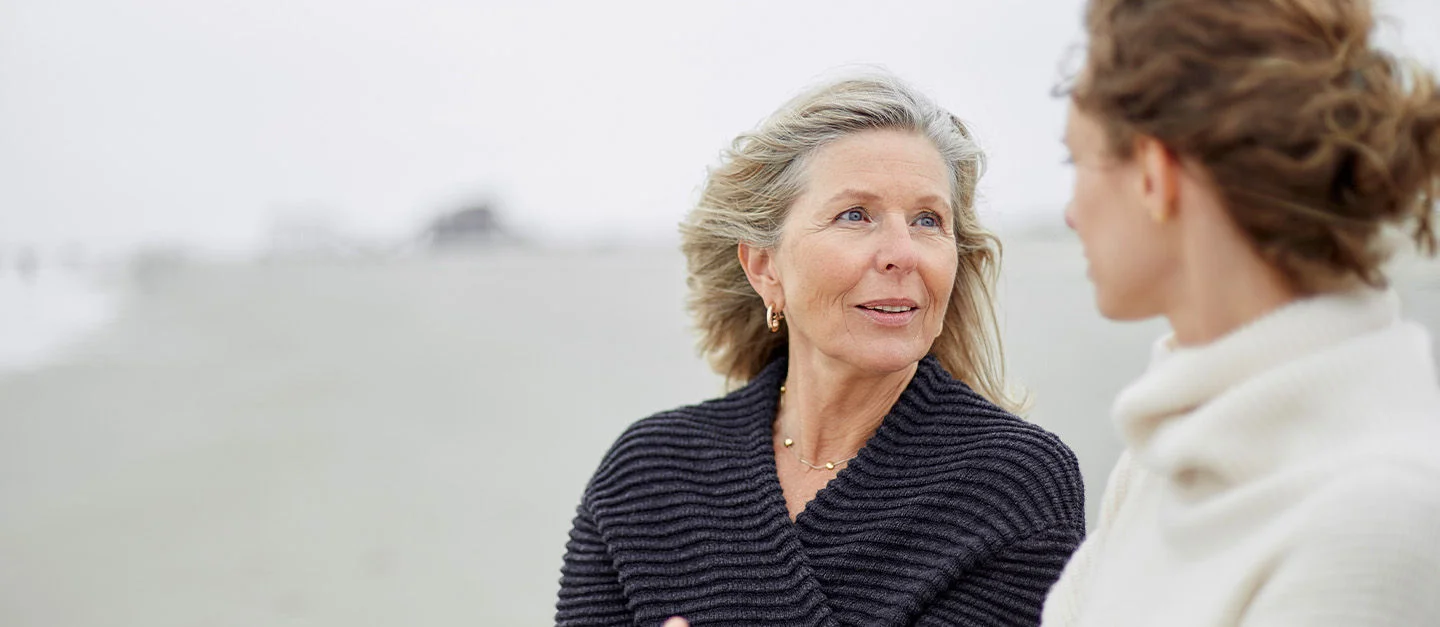Risk cover
Protection after a death
Important things to know if something happens to your spouse.
If the main wage earner in your family dies, it’s not just an emotional burden you have to cope with, but a financial one as well. In the event of death due to an accident, the mandatory benefits are normally sufficient to see you through. But things look different in the case of an illness.
A tragic accident or an incurable illness can suddenly change your life. When the unthinkable happens and a loved one dies, they often leave more than just grief behind. After all, how would your family cope financially if you were suddenly gone?
Without a well-thought-out pension plan, your death can cause financial fallout for your spouse. You can find out here where these financial consequences may arise. You will also learn how death benefits insurance can provide stability.
Death by accident or illness: big difference in insurance
The mandatory benefits vary greatly depending on whether the death is caused by an accident or an illness.
Accidental death – covered by social insurance
As with loss of earning capacity, compulsory protection is better for accidents than for illnesses. The reason for this is simple. In around 20 per cent of cases, an accident is the cause of death, while illnesses are responsible for 80 per cent.
If a spouse dies in an accident, their family receives up to around 80 per cent of their last salary. The benefits in this case comprise the following:
- The widow’s and widower’s pension from pillar 1 amounts to 80 per cent of the disability or retirement pension.
- The widow’s and widower’s pension from accident insurance amounts to 40 per cent of the deceased person’s insured salary.
- The orphan’s pension amounts to 40 per cent of the disability or retirement pension. Accident insurance pays 25 per cent of the insured salary per orphan and 15 per cent per half-orphan.
- The maximum insured annual salary for accident insurance purposes is CHF 148,200. Anyone earning more than that has to cover the difference through supplementary insurance.
Death due to illness – covered by social insurance
If a person dies from an illness, their surviving dependents receive only about 60 per cent of the deceased person’s previous income.
- The spouse’s pension from pillar 1 amounts to 80 per cent of the disability or retirement pension.
- From pillar 2, surviving dependents will only receive 60 per cent of the disability or retirement pension that the deceased person would have otherwise received.
- The orphan’s pension amounts to 40 per cent of the disability or retirement pension and the occupational pension plan pays out 20 per cent per child.
- The maximum insured annual salary for death due to an illness is CHF 85,320, which is much less than if the death was due to an accident.
Not all deaths are the same: there are significant differences in how wages are covered under compulsory social insurance.
A bar chart showing a possible financial gap in income in the event of death due to an accident or illness.
Social benefits at a glance
Legal basis for mandatory benefits
If a spouse dies, the surviving spouse is entitled to certain benefits under compulsory insurance:
- From the AHV, the surviving dependent receives survivors’ benefits. These benefits include pensions for widows, widowers and orphans. They are designed to prevent families from suffering financial hardship. The amount of benefit paid depends on the deceased person’s insured income.
- In the event of death as a result of an accident: If the deceased was covered by accident insurance, the surviving spouse will also be paid a pension if the death was due to an accident. Employers are required to insure their employees against accidents. Self-employed persons have to take out accident insurance themselves.
- If the cause of death is illness, the pension fund also pays a pension.
The total of these benefits must not exceed 90 per cent of the deceased person’s last salary. Otherwise, the deceased person is considered to have been overinsured, and the benefits will be reduced.
Questions and answers
The survivor’s pension includes the widow’s and widower’s pension and orphan’s pension for the deceased person’s partner and children.
Under the state and occupational pension schemes, marriages and civil partnerships are treated the same when it comes to widow’s and widower’s pensions. A surviving spouse is entitled to a pension if the following conditions are met:
- The survivor is responsible for supporting a child.
- The survivor is over 45.
- The survivor and deceased were married for at least five years.
- The widow’s and widower’s pension from pillar 1 ends at the latest when the surviving spouse reaches AHV retirement age, at which point it changes to a retirement pension.
- The widow’s and widower’s pension from the deceased’s occupational pension plan is paid for life. The exception to this is if the surviving spouse is very young (under 45 years of age) and has no children. In this case, they may only be entitled to a one-off lump-sum payment.
- The accident insurance pays a life-long survivor’s pension, provided that the surviving person does not remarry. If they remarry, a one-off lump sum equal to two annual pensions is paid.
The children of the deceased person are entitled to an orphan’s pension if they are under 18 or still in formal education. This applies regardless of the parents’ marital status.
An orphan’s pension is no longer paid once a child reaches the age of 25.
Mind the gap: where financial obligations can arise in the event of death
If spouses are not prepared for the death of their partner, the surviving person may face financial difficulties if the worst were to happen. From now on, existing costs from leasing agreements, mortgages and living expenses will have to be covered by just one person. And depending on the situation, certain other costs may also arise. This means everyday life will often need to be completely rethought. What is often overlooked, however, is the additional cost of childcare, housekeeping or caring for relatives.
Partnership: Protection after a death
When the main wage earner of a family dies, it can have major financial consequences. The burden must usually be shouldered by the surviving person alone. It not only puts the family’s normal standard of living at risk, but also jeopardises long-term plans and security.
Good to know: other forms of relationships and families
The statutory benefits provided by the AHV or pension fund are mainly aimed at married couples. This puts other forms of relationships and families at a disadvantage from an insurance perspective. Read about how financial security works in these cases in this article on cohabitation and blended families.
Mind the gap when it comes to living costs
Pensions from the AHV and pension fund usually cover the basic costs. However, they are usually not enough to maintain the survivor’s usual standard of living. Private loans or leasing costs are not covered by the AHV or the pension fund either. In these cases, a life insurance policy can provide support.
Mind the gap: your death not only means a loss for your surviving dependents, but also financial challenges. This has an impact on various areas of life.

You can’t plan for everything in life, but you can protect your family’s financial security. Get an overview of your financial obligations and our guide will help you identify any financial gaps.
Prévenir les lacunes : après votre décès, vos proches doivent non seulement faire leur deuil mais aussi faire face à des difficultés financières. Les répercussions se ressentent sur différents domaines de la vie.
Children: protection in the event of the death of a parent
Childcare and education cost a lot of money. If a parent dies, additional childcare costs may arise that place a strain on the household. There will also still be a financial responsibility for education, even with access to education funds and scholarships.
Mind the gap when it comes to education and study costs
The AHV and the pension fund pay orphan’s pensions, which usually only cover basic needs. The AHV and the pension fund also do not provide any direct protection for maintenance payments. Supplementary risk insurance closes the income gap here.
House and real estate: protection for your home
Owning your own home incurs ongoing costs such as mortgage payments and repairs. These costs still have to be covered after the death of the spouse.
Mind the gap when it comes to mortgage payments
The AHV and the pension fund do not cover mortgages. Even with maintenance costs, social insurance does not cover any ongoing costs or house repairs. These require other forms of financing.
Your family may be forced to give up their home and move into rented accommodation as a result of your death. With private death benefits insurance, you give your loved ones time to decide whether they want to stay in their own home and continue to pay off the mortgage, or move.
Transfer of inheritance, gifts, loans and leases
Depending on the canton and the amount inherited, inheritance or gift tax may be payable. These tax obligations can cause unexpected strain. Furthermore, your surviving dependents will be responsible for any personal loans, leasing agreements and other debts after you die.
Mind the gap when it comes to tax obligations and loans
The AHV widow’s and widower’s pension and the survivors’ pension from the pension fund often only cover a portion of ongoing living costs. For mortgages and personal loans, it makes sense to take out death benefits insurance. In addition, you can protect your family from financial burdens by making clear arrangements in your will and arranging gifts.
Support for relatives
Providing support for relatives, such as parents or other family members in need of care, can be an additional challenge. These obligations not only require a lot of time, but also financial resources, which may be tight if a family member dies.
Mind the gap when it comes to support obligations for relatives
No financial security is provided by the AHV or the pension fund to care for relatives. Any care costs therefore need to be covered by other means.
Conclusion: if the worst should happen, you want to know you’ll be covered.
As a general rule, if you have surviving dependents, it’s important to have a well-thought-out pension plan. Whether you’re getting married, have been in a relationship for years, are starting a family or are buying a home – it’s time to think about your pension. That way, your financial obligations won’t become a burden for your surviving dependents.
Closing gaps in pension cover with death benefits insurance
Close any gaps in your pension cover that could arise in the event of your death with a pillar 3 pension. A good solution is a death benefits insurance policy. Under this cover, a lump-sum death benefit will be paid to the person named in the policy if the policyholder dies.
Find out more
Suitable insurance products







 Contact
Contact
 Find an agency
Find an agency









 Close
Close






